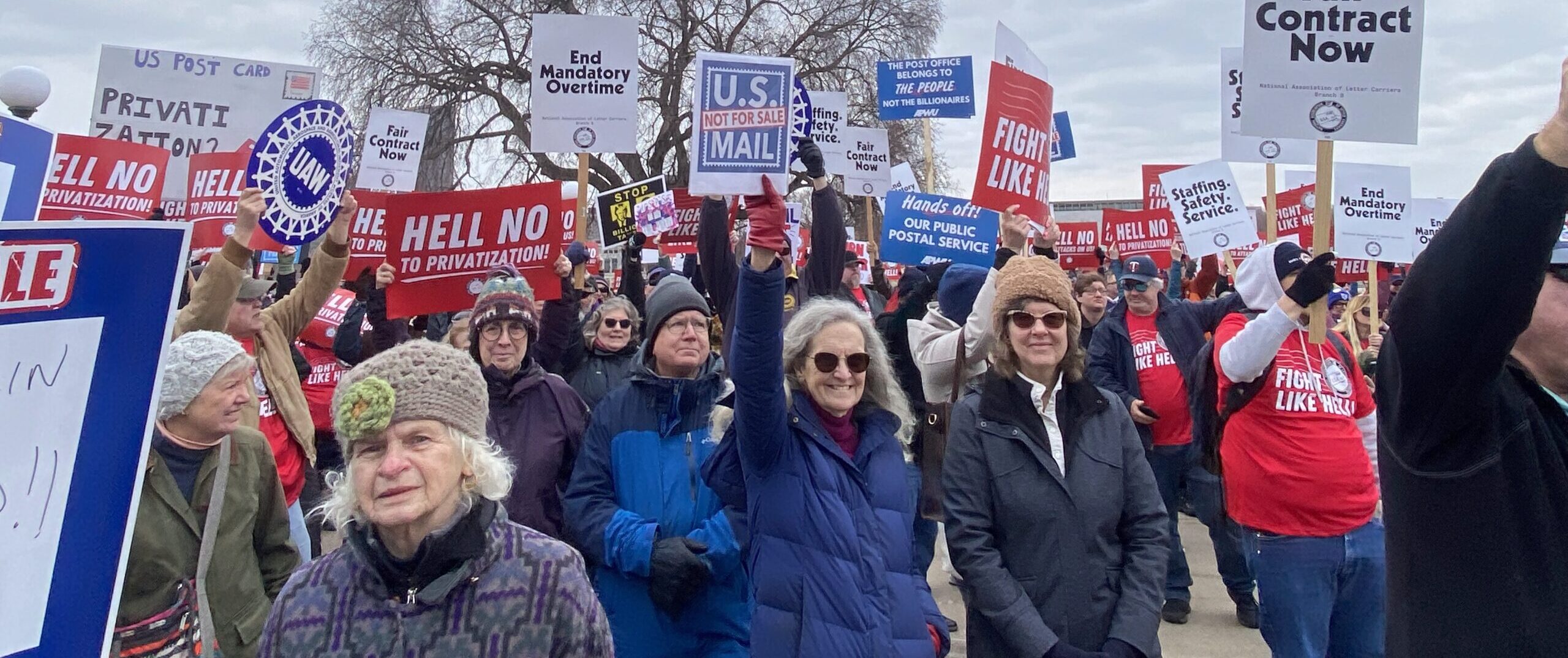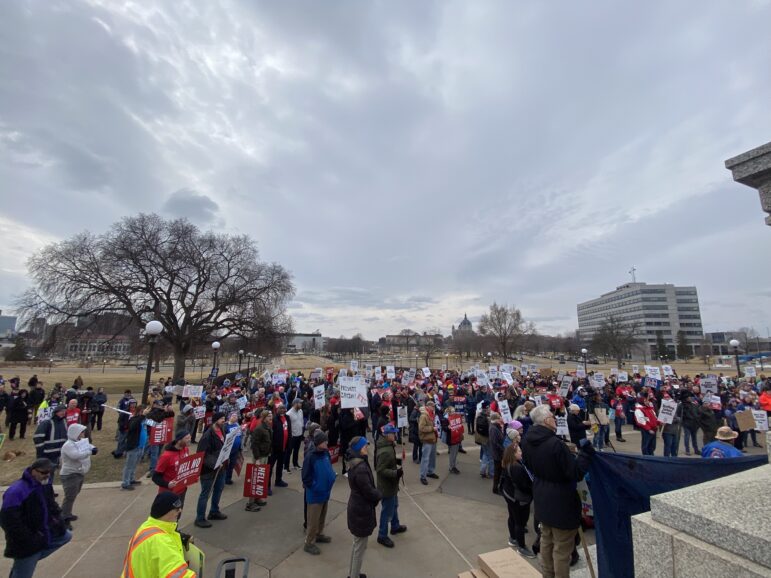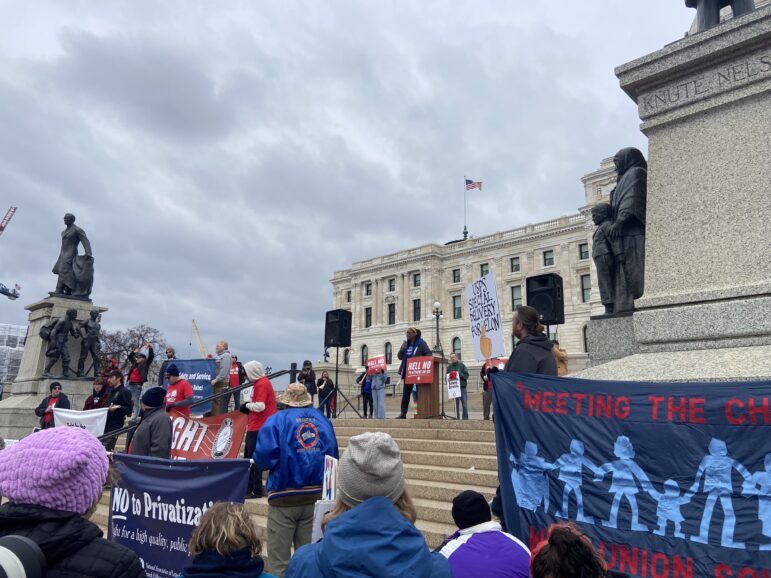
The crowd of postal workers and allies at the Minnesota State Capitol rallying against Trump’s proposal of privatizing the postal service.

Share
U.S. Postal Service workers with local branches of the National Association of Letter Carriers rallied at the Minnesota State Capitol on March 23, along with hundreds of community allies, Minnesota unions, and politicians to demand a strong contract—and oppose the Trump administration’s recent threats to privatize the postal service and reduce services.
“Public sectors are the frontline, they will go after private sectors next,” said Tyler Vasseur, a postal worker with the National Association of Letter Carriers (NALC), Branch 9. Vasseur led the crowd with rallying cries for better pay, and denunciations of privatization and possible layoffs. For the upcoming contract, Vasseur stated that postal workers are fighting for a $30-per-hour starting wage and the right to strike. The rally was part of a nationwide day of action to oppose the dismantling of the postal service, organized by NALC.
In early March, the Trump administration restated the president’s first-term goal of privatizing the institution, by merging the postal service with the Department of Commerce in order to allow the administration more control over its operations. If the departments were to merge, the postal service would fall under the control of Commerce Secretary, businessman, and Trump ally Howard Lutnick. In one report, Lutnick proposed merging the postal service with the U.S. census in an effort to cut costs.
This week, Louis DeJoy, the postmaster general and vocal supporter of Trump, resigned after five years in the position. While no official executive orders have been announced, workers and those who rely on services express concern about the uncertain future of the postal service, one of the longest standing public institutions in the country.

Isabela Escalona
The crowd of postal workers and allies at the Minnesota State Capitol rallying against Trump’s proposal of privatization the postal service.Speakers at the rally warned that privatization of the post office would especially harm rural communities, which many private courier services like FedEx, UPS, and Amazon do not have a profit incentive to serve adequately. Postal workers also warned that privatization of the postal service could possibly increase prices for all courier services, as the only public option for mail and delivery services would be gone.
Neal Gosman, a worker with American Federation of Government Employees (AFGE) Local 899, representing TSA workers, stated, “The postal office was founded before the Declaration of Independence, with the value of communication without royal or private interference.” Gosman warned of the possibility of executive orders busting their union, as seen with TSA workers earlier this month. On March 7, The Department of Homeland Security unilaterally ended the bargaining agreement with the AFGE—one part of the Trump administration’s attack on federal workers and public sector unions.
The rally comes amid increasing attacks on public sector workers. On March 27, after the demonstration took place, the Trump administration signed an executive order that seeks to end collective bargaining with federal employees, citing dubious national security concerns. The order affects up to 1 million workers and has sparked considerable outrage within the US labor movement.
Minnesota Senator Tina Smith also stood with the workers at the rally and stated that the postal service is the “only agency in the constitution. It is a fundamental service, not a luxury—a necessity for social security, veterans checks, and prescriptions deliveries.”
Senator Smith described DeJoy and other Trump administration officials as conducting a “hostile takeover,” characterized by “a drop in services and a rise in prices”.
Andrew Hagen, a mail carrier with NALC Branch 9, underlined the sheer scope of the postal service—both in the amount of deliveries and the amount of workers who could be impacted by privatization and reduction in services. Hagen said the postal service is a major employer for veterans, employing around 70,000.
Ryan Timlin, former union president of the Metro Transit workers, was also present and standing in solidarity with postal workers. Timlin argued that “public sector workers need to fight back to end assault on all public workers. Next is private sector workers.” Timlin also warned of higher prices under a privatized post office, asking the crowd, “What will happen when postal service is private? You think UPS/Fedex/Amazon shipping will go down?” Timlin and other workers also shared how privatization is a real estate opportunity for corporations, where distribution centers and other postal offices are sold to the highest bidder.

Isabela Escalona
Marcia Howard, president of the Minneapolis Federation of Teachers, speaks at the postal workers’ rally in front of the Minnesota State Capitol.Marcia Howard, president of the Minneapolis Federation of Teachers, spoke at the rally and stated, “If they come after postal service workers, then they’re coming after public education next, and then the VA.” The Department of Education is one of many other federal agencies being gutted by the Trump administration.
In an interview with Workday Magazine, postal worker David Ayres, delivering mail since 1978, said, “We’re a service, not a business.”
Ayres criticized both current and past administrations’ attempts to profit from the postal service without also realizing gains for its labor force. “Whenever labor wants a pay increase they make it out like it’s some outrageous thing, but then they want a profit increase, no one says anything. They have a double standard.”

